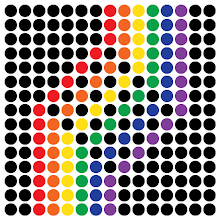You know too much
First, my day:
- Slept in
- Went to an art show in a squat near Belleville, called "Fragile," which was all art based on and around the body. The works themselves were hit or miss, but some of it I really liked. There was one video installation called Allumettes, which was time-lapse footage of a book of matches burning. The shots were taken from the side, so what looked at first like one match would eventually flower into a twisted bouquet of charred wood. I don't know why, but it was beautiful.
- A friend and neighbour, who had accompanied me to the art exhibition, came with me to a Vietnamese restaurant on the other side of the Belleville métro station, where I had some delicious, delicious pho (apparently pronounced "feu"). This time, I didn't go for the "special" pho (with tripe, tendons and nerves).
- Got home and blogged and emailed and generally tried hard to wrap up the previous week's business.
So, I've been noticing something about me over the past week, but I've only thought to comment about it now. I've always thought that there were three basic stages in language acquisition:
- Total know-nothing beginner. You sould like a moron and you have real trouble articulating yourself.
- You're familiar with the language. Although your pronunciation and vocabulary aren't perfect, you can speak with ease and you begin to feel confident about your proficiency.
- You're fluent. People mistake you for a native speaker. You're a linguistic rockstar.
What I've come to realize is that there's actually an intermediary step that I was unaware of:
- Total know-nothing beginner. You sould like a moron and you have real trouble articulating yourself.
- You're familiar with the language. Although your pronunciation and vocabulary aren't perfect, you can speak with ease and you begin to feel confident about your proficiency. You're making tons of subtle errors that make you sound "foreign," but you can't tell and you manage to make yourself understood.
- Now that you've absorbed the "feel" of the language, you begin to realize how many glaring errors you are still making, and you become hesitant and halting in your speech.
- You're fluent. People mistake you for a native speaker. You're a linguistic rockstar.
I've noticed this because I recently plunged into this new stage. It seems like I've finally absorbed something like a Chomsky-esque "deep structure" of French, which has made me all the more aware of my lack of proficiency. What makes this difficult is that I can't produce idiomatic and "natural" French phrases, but I can totally detect them; I can now read English-French translations and say, "That's correct, but it doesn't really sound French," without knowing how or why. As lovely as this sort of subconscious knowledge may be, it has also rendered me hyper-aware of how un-idiomatic all my utterances are. All of a sudden, I've lost the smooth confidence I had only a few weeks ago--even though I know objectively that my French has improved overall.
So, the result is that the French that I DO produce tends to be much better and "natural," but I'm a lot slower and I tend to obsessively correct myself. Agh! This is especially frustrating because so much of socializing in nightlife (i.e. clubs) relies on a "smooth" experience. Too many pauses, errors or breaks risk causing me to lose my rapport with the people I'm interacting with.
Also, I think my English is getting worser.




Aucun commentaire:
Enregistrer un commentaire